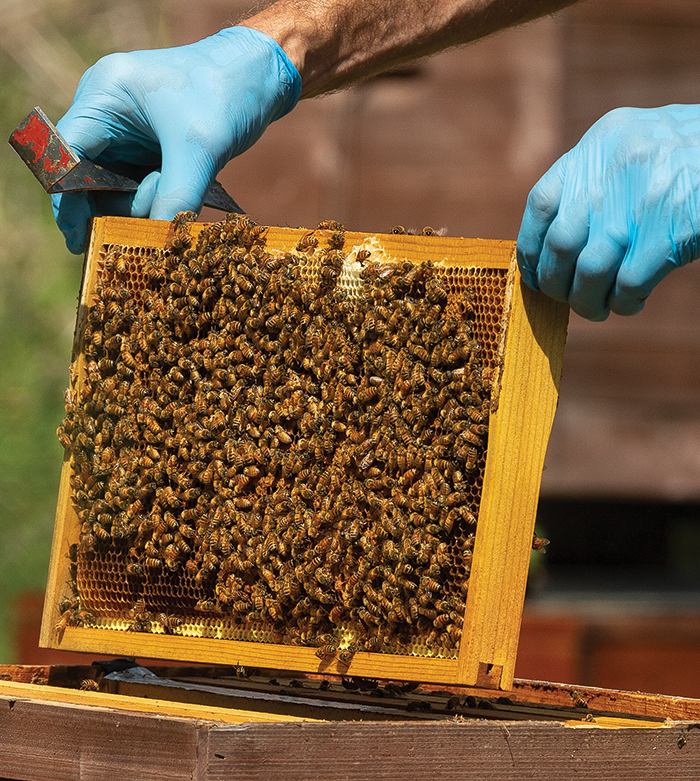
Ben Dictus, a beekeeper with Bee Downtown, checks the hives at SAS in Cary. A professional beekeeper for nearly five years, he compares the job to a farmer caring for his cows. It takes time and knowledge, he says, because “there’s a lot that can go wrong.”
It’s a honey of a relationship with two unlikely partners — big business and tiny bees.
Triangle-based Bee Downtown plays matchmaker, convincing companies to install beehives on their urban campuses. Along with the hives and some honey, companies get leadership training and team-building activities inspired by the industrious insects. And everyone can be proud that they’re helping rebuild healthy honeybee populations.
“It’s a sustainability initiative, but the bees are a conduit for us to be able to have engagement activities for employees and run leadership development training,” said Bee Downtown founder Leigh-Kathryn Bonner, a fourth-generation beekeeper. “That’s when we really found our, for lack of a better word, sweet spot.”
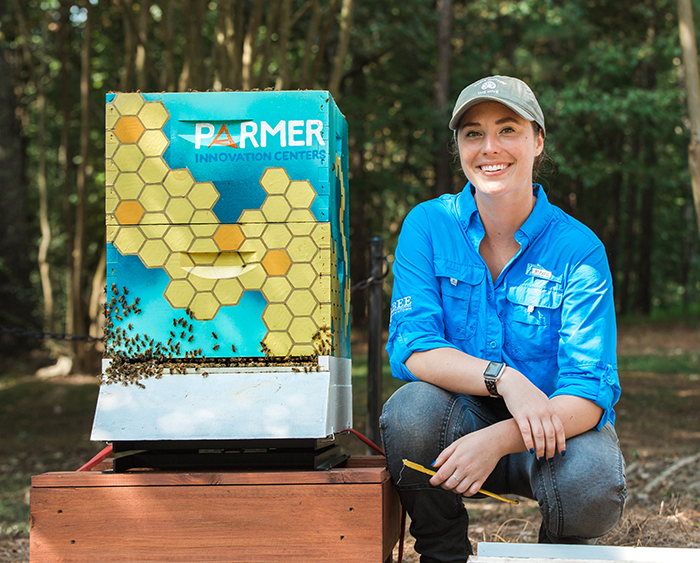
Bee Downtown founder Leigh-Kathryn Bonner says starting the company was a way for her to honor her family’s history in agriculture. “Some of my favorite memories growing up were on our farm,” she says. “My grandpa taught us what it means to put in the work to take something from seed to harvest.”
The area’s large verdant campuses — with their well-tended flowering landscapes — are like all-you-can-eat buffets for bees. And corporations are always searching for unique ways to create great places to work, Bonner says.
She launched the company in 2014, while still a student at N.C. State University. Burt’s Bees and the American Tobacco Campus were among the first to partner with Bee Downtown. Today, the company manages 150 hives in the Triangle and about 100 in the Atlanta metro area. Among its clients are three top employers in Western Wake — SAS, MetLife and Cisco.
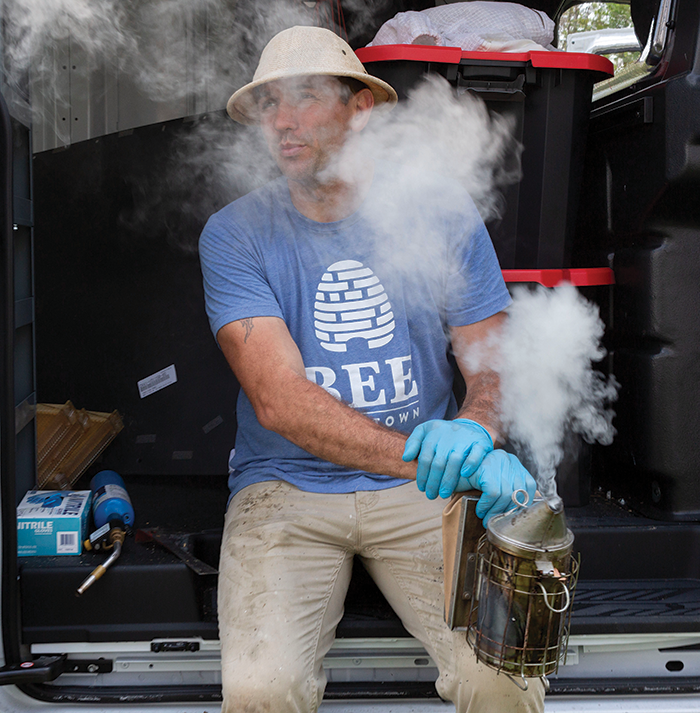
Ben Dictus prepares a smoker before opening the SAS beehives. The smoke calms the bees, making it less likely they will sting.
SAS, the early adopter
“SAS is one of the very first companies ever to get behind us. They believed in us at the very beginning, when it was still one of these crazy ideas that everybody thought was kind of kooky,” said Bonner. “The first conversation I had with the SAS sustainability team was, ‘Well, we’ve already got sheep, and they mow the lawn on the solar panel farm, so we can definitely get bees.’”
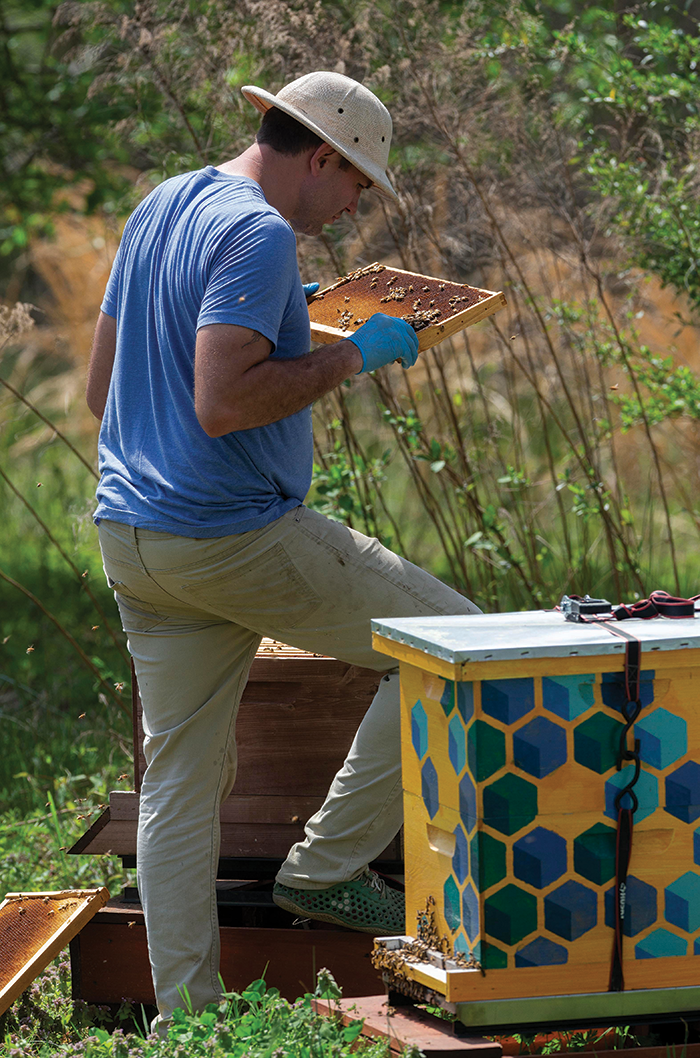
One of Bee Downtown’s advantages is its reliance on professional beekeepers to monitor its hives and see what works to keep bees healthy. Founder Leigh-Kathryn Bonner says Bee Downtown’s loss rate is less than half of the national average.
The software company’s four hives are nestled between a low stand of trees and a largish pond, away from unsuspecting office-dwellers and close to the solar farm, which has been planted with a low-growing clover specifically for the honeybees, according to Jerry Williams, SAS Sustainability Program manager.
While sponsoring the beehives has a philanthropic element, he says the company gains plenty from the relationship, and he’s not just talking about the 140 pounds of SAS honey that was harvested last year.
“The biggest benefit is the awareness and engagement with the employee tours, the internal articles that we have on our intranet, which help educate people about the importance of bees and why we’re doing this,” Williams said. “From the environmental position, we’ve been advocating for clean energy and being good corporate citizens for a number of years.”
SAS has also put a data analytics spin on the beehives, installing sensors to measure hive weight, humidity and temperature. There are even microphones to catch the latest buzz. The goal is to showcase what is possible with SAS software, but Williams and his colleagues hope the data will help beekeepers in North Carolina and beyond.
“There’s lots of practical things we know about bees, but we also don’t know a lot about bees,” said Ben Dictus, a Bee Downtown beekeeper. “Like the sound thing, we don’t really know what sounds mean. So, maybe when there’s fluctuations in temperature, certain sounds mean certain things.
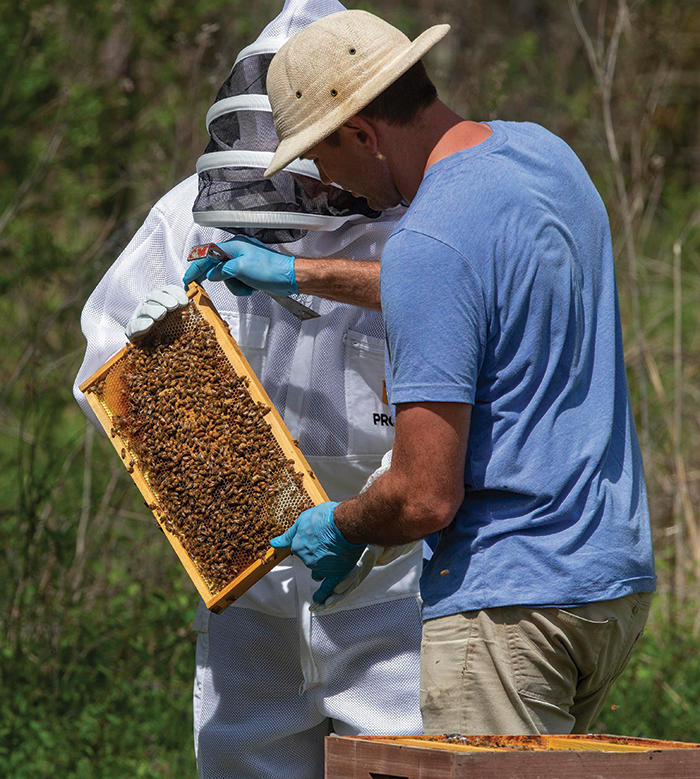
Dictus and Jerry Williams, SAS Sustainability Program Manager, open up one of the SAS hives. The location is particularly well-suited for bees, with nearby water, plenty of sun and lots of nutritious flowering plants — grassy fields with wildflowers, pollinator-friendly plantings on the campus, and native trees like tulip poplar, pear and black locust.
“There’s a whole slew of practical things that we might be able to learn.”
MetLife, the missing link
Among those practical things are how to help the bees thrive in the face of environmental threats. Bonner describes these as the four P’s – pests, poor management, pesticides and poor nutrition.
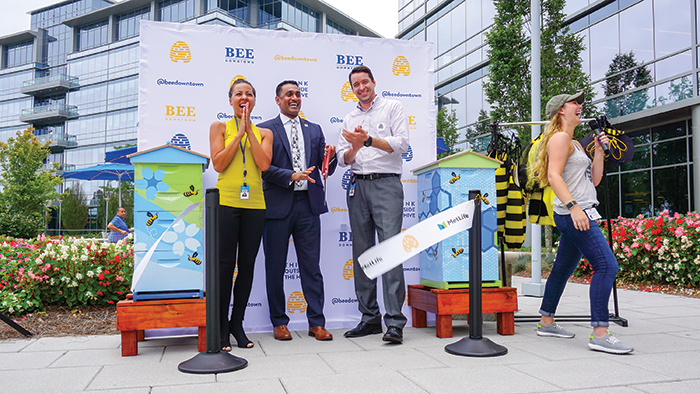
Binu Thomas, senior vice president at MetLife, second from left, and other employees unveil the Bee Downtown hives at an event in September. Leigh-Kathryn Bonner, right, says Thomas “fought to not let the beehive conversation die and to keep it going. That’s really special to see executives and leaders of these corporations deeply invested in something.”
The parasitic varroa mite is enemy number one. Although common, Dictus says the mites can be controlled by attentive beekeepers. Left untreated, the pest can destroy its host hive and spread to healthy hives. The last two threats are linked to urban landscaping: mosquito-spraying, non-native plants and close-cropped, dandelion-free lawns.
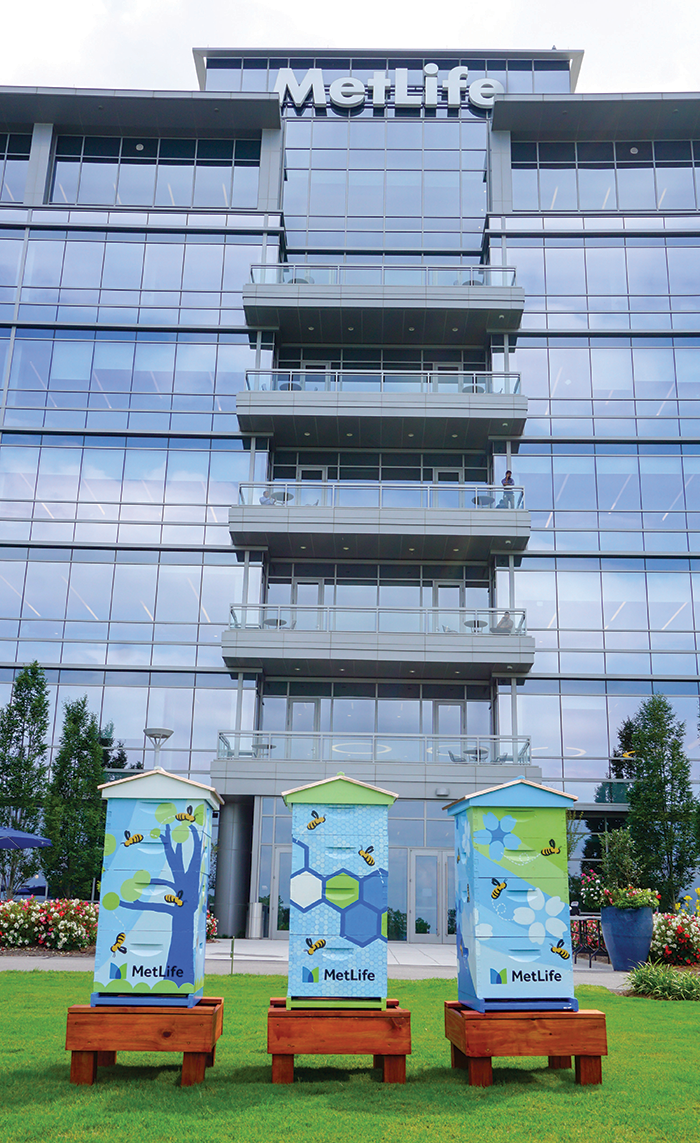
Contributed photo
By educating people about pesticides and habitat, Bee Downtown has had its biggest impact.
“It’s not just putting bees there,” said Bonner. “Companies start to plant more native plants, and they stop spraying, and then they have pollinator events for their employees.”
Last year, when MetLife agreed to place three hives at its Cary campus and committed to making its environment bee-friendly, a 60-mile-long corridor of healthy habitat was established. The overlapping territories of bees from adjacent hives extend from Durham, through Research Triangle Park, to Raleigh and Garner.
According to Bonner, MetLife’s senior vice president Binu Thomas was instrumental in getting the beehives at the Cary campus.
“At first, the draw for me was the important role that bees play in sustainability and growing the food we all eat to survive,” he said, in a written response. “As I learned more, I was fascinated by how bees work as a team and communicate with each other to ensure the well-being of the hive. There are lessons in that for companies, including MetLife.”
Creating buzz at Cisco
Another passionate advocate for bees, Cecile Willems, marketing director at Cisco, moved to Cary from Germany in 2012 and saw a “huge opportunity” to create a haven for pollinators — and to eventually install beehives at the RTP site. She partnered with Jordan Hart-White, energy and sustainability manager, to get the idea off the ground.
Hart-White had met Bonner at a conference in Atlanta, and suggested that Cisco work with Bee Downtown. The proposal was initially quashed due to safety concerns, but the two Cisco women didn’t give up. Instead they worked with Bee Downtown staff to make a case for the beehives’ safety and their beneficial impact on the environment.
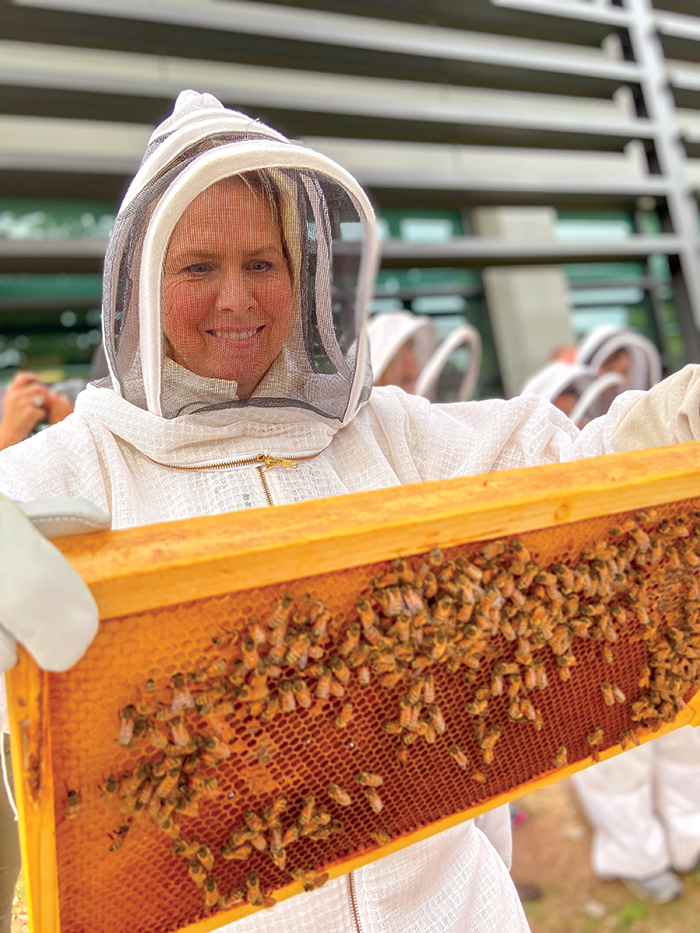
Cecile Willems, clad in a protective bee suit for a Bee Downtown event, says she “grew up in a family that had a lot of passion for healthy living and organic gardening, really valuing nature and working with nature.”
Long a supporter of conservation efforts worldwide, Cisco in 2018 set ambitious goals for its local campus — to achieve 100% renewable energy, water neutrality and zero waste.
“This initiative is fully embedded into our corporate social responsibility initiatives,” said Willems.
In December, the company agreed to sponsor three hives, and while the official launch in April was delayed by social distancing protocols, the Cisco bees are busy pollinating, and Hart-White and Willems are working on employee engagement activities. On the list are honey-tastings and a beekeeping class.
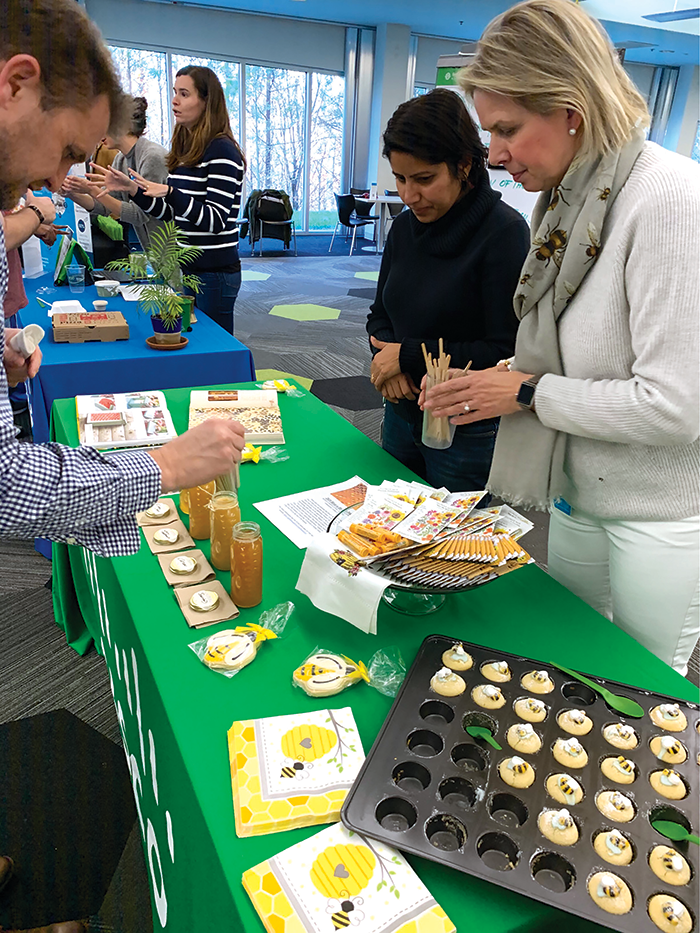
She formed a beekeeping interest group at Cisco in 2018, which organized educational events and honey-tastings.
“Even though we’re not an agricultural company, or maybe don’t connect to the bees that directly, to still be able to support them as a technology company, was really cool,” said Hart-White.
The feedback from employees has been “absolutely overwhelming,” says Willems. The initial interest group went from 35 people to 400 after Cisco announced that the bees were coming.
“Cisco employees are so passionate about these topics, and this allows everybody to be part of something right here on our campus, right here in our backyard,” she said.
- Hive Mind
- Do the Hustle
- Takeout, Delivery & Crossed Fingers
- Liquid Assets: Smoothsicle from Funguys Brewing
- Smell, Seek, Find
- Pet Parade: Our Awesome Animals
- Small Business Spotlight: Woof Gang Bakery
- Nonprofit Spotlight: Best Friend Pet Adoption
- From the Editor: Fleeing from the Virus
- Garden Adventurer: The Constant Color of Sun Coleuses






Kudos to Bee Downtown, SAS, MetLife, and Cisco for taking leadership roles in building healthy honeybee communities in a manner enabling their people to learn, grow, and make a difference.